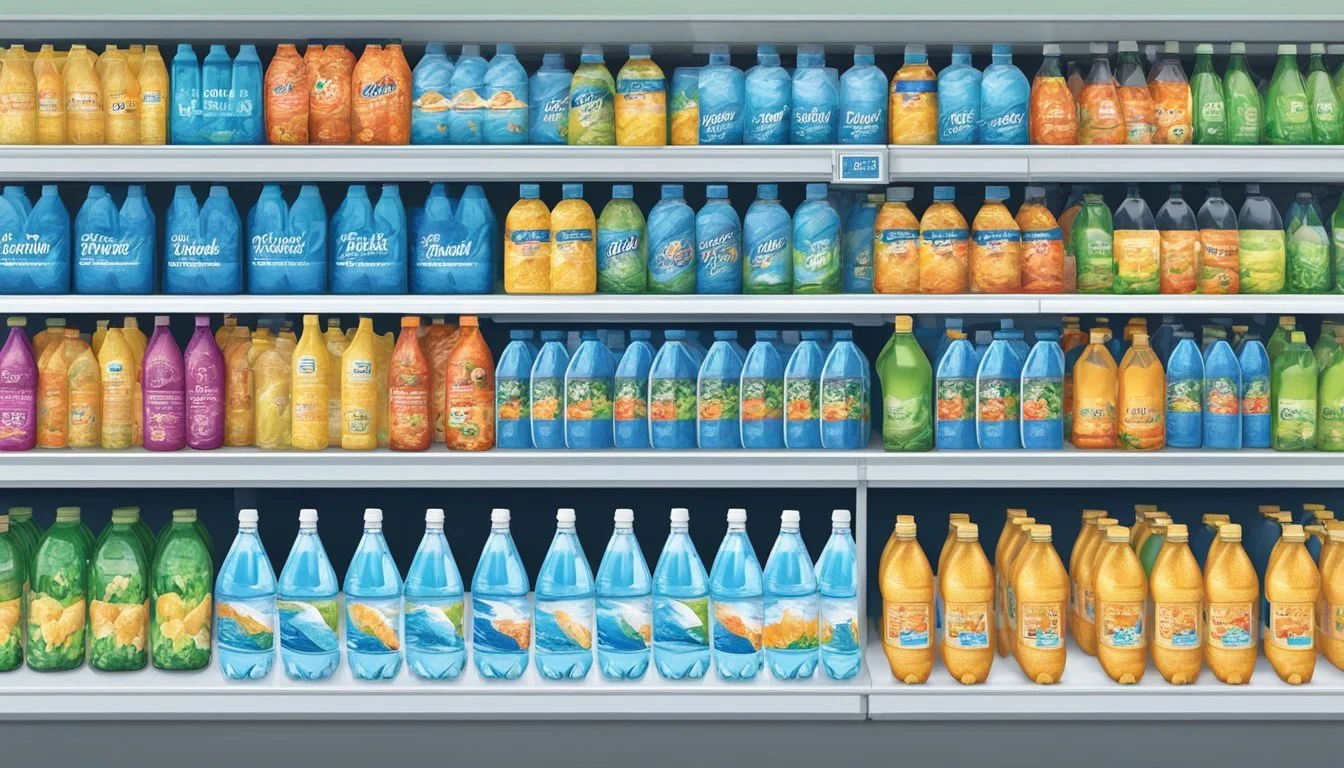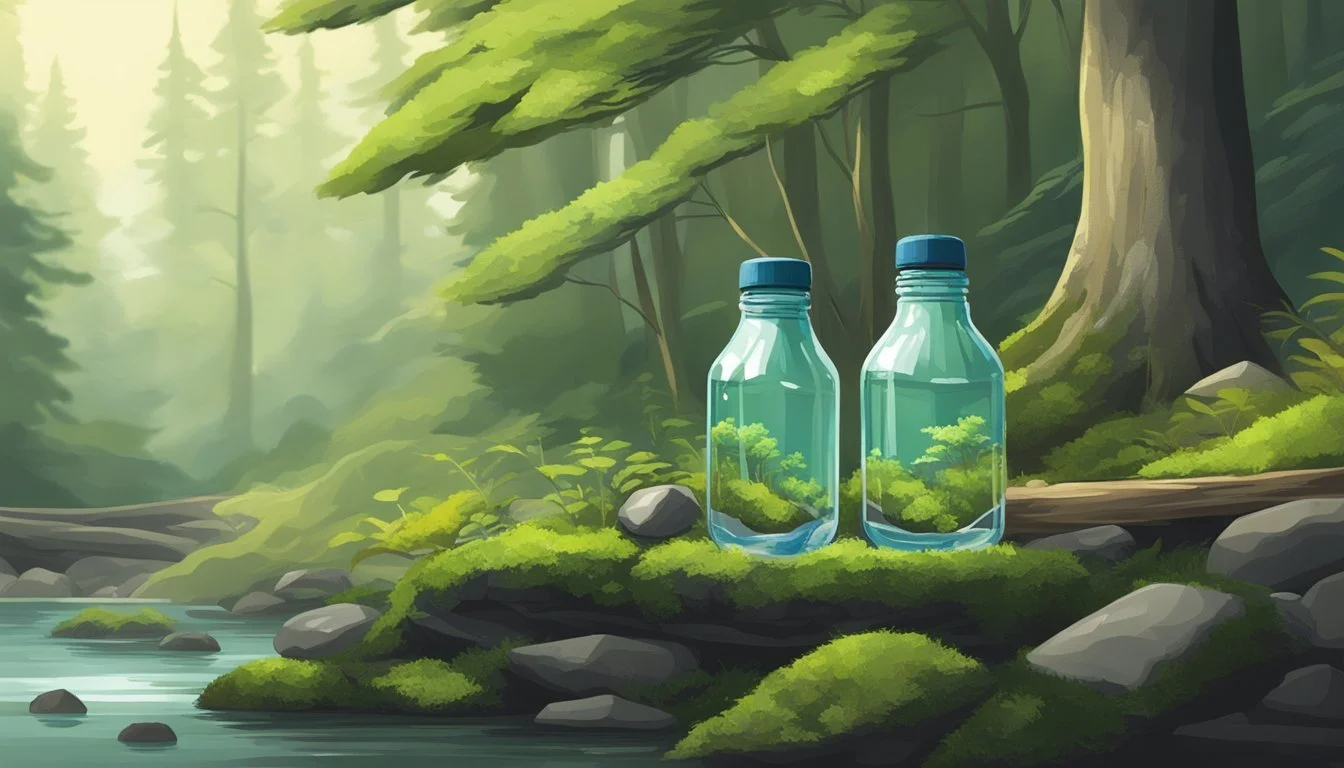Deer Park vs. Cascade Mountain
Comparing Quality and Taste
When it comes to bottled water, many consumers find themselves choosing between popular brands like Deer Park and Cascade Mountain. These two brands promise to deliver high-quality, refreshing spring water, but how do they compare in terms of taste, health benefits, and hydration? Deer Park, sourced from natural springs across the Eastern Seaboard, offers a crisp and clean taste that appeals to many.
Cascade Mountain also prides itself on providing pure, reliable spring water. It boasts a velvety texture with a slight mineral hint that some drinkers find uniquely refreshing. Both brands claim to be 100% natural spring water, but discerning which one truly stands out can be a matter of personal preference.
For health-conscious consumers, the quality of the water source is crucial. Deer Park and Cascade Mountain adhere to strict standards to ensure their water is free from contaminants. Ultimately, the choice between Deer Park and Cascade Mountain may come down to taste and texture preferences, as both brands maintain high standards for purity and hydration.
The Origin of The Waters
Deer Park and Cascade Mountain are both renowned for their natural spring water, sourced from specific geographic regions rich in natural resources. Each brand taps into unique origins that fundamentally influence the water's purity and taste.
Natural Sources and Collection
Deer Park sources its water from multiple springs along the Eastern seaboard, particularly in Maryland. This region is known for its pristine natural conditions, ensuring high-quality water. The water undergoes minimal processing, retaining its natural minerals and freshness.
Cascade Mountain originates from the Cascade Mountain Range. This area boasts clean, untouched springs that provide high-quality, natural spring water. The waters collected here are rich in essential minerals, contributing to their distinct taste.
Both brands prioritize maintaining the purity of their sources, ensuring that the water collected remains natural and uncontaminated. Their collection practices emphasize sustainability and environmental protection, crucial for preserving these natural springs for future generations.
Regional Availability and Brands
Deer Park water is primarily distributed across the Mid-Atlantic region of the United States. It is a staple in states like Maryland, Pennsylvania, and Virginia. Owned by BlueTriton Brands, Deer Park has a strong regional presence, ensuring consistent availability for its dedicated consumer base.
Cascade Mountain water, in contrast, is more commonly found in the Northwestern United States. It appeals to consumers who value the clean, mineral-rich water that the Cascade Range provides. The brand emphasizes its regional heritage, distinguishing itself from competitors.
Both brands have built loyal customer bases within their respective regions, leveraging their unique origins and natural spring water credentials. Consumers appreciate the regional authenticity and high quality that both Deer Park and Cascade Mountain offer.
Health and Safety Considerations
In evaluating Deer Park and Cascade Mountain bottled waters, it's crucial to examine the health and safety aspects to ensure a reliable choice for consumers. This includes analyzing regulatory compliance, potential contaminants, and the mineral content of both brands.
Regulatory Compliance and FDA Regulations
Deer Park and Cascade Mountain must comply with stringent regulations set by the FDA and the EPA to ensure their bottled water is safe for consumption. FDA regulations for bottled water require it to meet the same safety and quality standards as public water systems, which covers contaminants, labeling, and manufacturing practices.
EPA standards focus on the source of the water, requiring regular testing for pollutants. Both companies must provide annual water quality reports that detail their compliance with legal limits for various contaminants such as lead and bromate. This compliance ensures that consumers receive water that adheres to national health standards.
Contaminants and Purity
Ensuring minimal contamination is paramount for both brands. Consumer Reports has identified that some bottled waters contain PFAS chemicals, which are harmful to health. Deer Park prides itself on its natural spring sources and consistently publishes quality reports indicating low levels of contaminants. This brand's water is monitored for heavy metals like cadmium and arsenic, ensuring they remain well below federally mandated safety levels.
Cascade Mountain also claims high standards of purity, regularly testing for a broad spectrum of contaminants, including PFAS. Their transparency in disclosing any findable levels builds trust among health-conscious consumers. Both brands must ensure their water remains free from pollutants to maintain public health safety.
Minerals and Electrolytes
Mineral content varies significantly between bottled water brands, impacting both health and taste. Deer Park water boasts a balanced profile of minerals and electrolytes such as calcium, magnesium, and potassium, which are crucial for bodily functions. Their water is renowned for its crisp taste, attributed to this balanced mineral composition.
Cascade Mountain, alternatively, also offers naturally occurring minerals from its spring sources. Understanding the specific mineral profile helps consumers who may seek water with higher electrolyte content for hydration and replenishment purposes. Highlighting these minerals emphasizes both brands' commitment to quality and health benefits, distinguishing them in a competitive market.
Tasting Profiles
When comparing the Deer Park and Cascade Mountain bottled waters, key distinctions emerge in their taste profiles. Factors such as palate experience, aftertaste, and mineral-driven taste variance play significant roles in shaping consumer preferences.
Palate Experience and Aftertaste
Deer Park water offers a clean, crisp taste, widely appreciated by consumers. This natural spring water is sourced from the Eastern Seaboard and carries a reputation for refreshment without any lingering aftertaste.
Cascade Mountain water, sourced from pristine mountain springs, has a slightly sweet undertone. The velvety texture enhances its smoothness, making each sip a pleasant experience. An aftertaste is minimal but more noticeable compared to Deer Park, showcasing a hint of the minerals present.
Mineral-Driven Taste Variance
The mineral content in Deer Park water is relatively balanced, contributing to its neutral taste profile. This makes it a versatile choice, appealing to those who prefer minimal interference with the natural taste of water.
In comparison, Cascade Mountain water contains a higher mineral content, giving it a unique, minerally taste. Those who enjoy a more distinctive flavor in their water may find this aspect particularly appealing. These minerals not only influence the flavor but can also offer slight health benefits, enhancing the overall drinkability of the water.
Environmental and Sustainability Issues
Examining the environmental and sustainability aspects of bottled water helps in understanding the broader impacts of Deer Park and Cascade Mountain. This includes evaluating their bottling processes, plastic usage, and recycling policies.
Bottling Process and Plastic Usage
Both Deer Park and Cascade Mountain utilize plastic bottles. Deer Park typically uses single-use, BPA-free plastic bottles made from petroleum-based plastics. These bottles contribute to plastic waste and environmental pollution.
Cascade Mountain also uses BPA-free plastic bottles. They have initiated measures to reduce plastic usage by incorporating recycled plastics in their manufacturing process.
Cutting down on virgin plastic helps decrease their environmental footprint. Despite these efforts, both brands still rely heavily on plastic, posing significant sustainability challenges.
Recycling and Environmental Policies
Deer Park has established recycling initiatives to mitigate its environmental impact. They encourage consumers to recycle through clear labeling and partnerships with recycling programs. Deer Park also promotes a circular economy by using recyclable materials where possible.
Cascade Mountain takes a proactive approach to sustainability by integrating comprehensive recycling practices. They advocate for responsible environmental policies and support waste management programs.
By using a higher percentage of recycled materials in their bottles, Cascade Mountain aims to reduce their overall carbon emissions and plastic waste.
Both companies recognize the importance of recycling but differ in their implementation and scope. Deer Park focuses on consumer participation, whereas Cascade Mountain emphasizes the use of recycled content in their products.
Consumer Preferences and Purchase Behavior
Consumer preferences and purchase behavior for bottled water often hinge on price points, brand loyalty, and company ethics.
Price Points and Cost Factors
Consumers generally consider cost a significant factor when choosing bottled water. Price variations exist based on the source of the water and the packaging. For instance, Deer Park is often found in regional grocery stores and is known for its competitive pricing, making it accessible to a broad audience.
In contrast, Cascade Mountain, being a premium brand, may command higher prices. This higher cost can be attributed to its sourcing techniques and branding as a high-quality product. Whole Foods and specialty stores frequently stock such premium brands, catering to consumers willing to pay more for exceptional quality.
Convenience stores often mark up prices due to the convenience factor, impacting buying decisions, particularly for budget-conscious shoppers. Bulk purchasing options generally offer better value, appealing to families and regular bottled water drinkers.
Brand Loyalty and Company Ethics
Brand loyalty plays a significant role in consumer choices. Many consumers prefer Deer Park for its wide availability and consistent quality. Brand trust is often built through positive experiences and sustained marketing efforts.
Ethical considerations also influence purchase behavior. Companies with transparent sourcing practices and sustainable operations tend to attract ethically-minded consumers. For instance, water brands that engage in eco-friendly packaging and contribute to community initiatives can positively impact buyer loyalty.
Ethical branding strategies, such as minimizing plastic use or supporting water conservation, resonate well in the current market where sustainability is increasingly valued. Consumers aligned with these values tend to remain loyal to brands that reflect these principles.
Industry Landscape and Competition
The bottled water market features intense competition among numerous global and regional brands. Understanding where Deer Park and Cascade Mountain fit into this landscape is crucial.
Comparison of Major Brands
Deer Park and Cascade Mountain are both recognized for their natural spring origins. Deer Park is heavily marketed on the Eastern seaboard and claims 100% natural spring water. It is a product of Bluetriton Brands. Cascade Mountain, another player, emphasizes its pristine source and crisp taste, aiming to rival brands like Fiji and Evian.
In comparison to Coca-Cola’s Dasani and PepsiCo’s Aquafina, which undergo purification processes, Deer Park and Cascade Mountain pride themselves on minimal processing, targeting consumers seeking natural spring water. Nestlé’s Poland Spring is another major competitor in this category, boasting springs in the Northeast.
Other notable mentions include Smartwater with its vapor distillation for a clean taste, and luxury brands like Voss and Acqua Panna, which cater to niche markets with their premium pricing. Cascade Mountain aims to penetrate this segment, promoting its premium quality.
Overall, the competition is diverse, with each brand leveraging its unique source, processing method, and regional availability to attract dedicated consumer bases. Total sales in the bottled water industry continue to grow, driven by increasing consumer preference for clean, easily accessible hydration.
Water Quality Analysis and Reports
Water quality is a critical aspect when comparing bottled water brands. Factors like pH levels, alkalinity, and expert analyses play a pivotal role in determining which brand stands out.
PH Levels and Alkalinity
The pH level of water typically ranges from 0 to 14, with 7 being neutral. Water with a pH below 7 is considered acidic, while a pH above 7 indicates alkalinity. Deer Park water, sourced from multiple springs in the eastern United States, often boasts a neutral to slightly alkaline pH, usually around 7.5. This makes it suitable for those seeking balanced hydration.
Cascade Mountain water, drawn from springs in the Pacific Northwest, typically has a pH level between 7.2 and 7.8. This slight alkalinity can contribute to a crisper taste, preferred by some consumers. The alkalinity of Cascade Mountain water can also appeal to individuals who believe alkaline water offers health benefits, such as better hydration and maintaining body pH balance.
Expert Opinions and Studies
Experts and studies provide valuable insights into bottled water quality. According to the International Bottled Water Association (IBWA), both Deer Park and Cascade Mountain water meet strict safety and quality standards. These standards ensure that levels of contaminants, such as mercury, are well below federal limits.
Recent studies by independent organizations have tested various bottled waters for toxic chemicals like PFAS. While Deer Park water generally shows minimal traces, Cascade Mountain maintains a similarly low level, reinforcing their commitment to water purity.
Consumer Reports and similar entities often highlight the importance of these findings. With both brands adhering to stringent quality controls, consumers can have confidence in their safety and groundwater sourcing practices.
Deer Park's crisp taste and Cascade Mountain's slightly alkaline profile offer distinguishing features. Studies corroborate the high-quality standards both brands maintain, supported by expert analysis and rigorous testing.
Innovation and Technological Advancements
In comparing Deer Park and Cascade Mountain bottled waters, it's crucial to consider how each brand leverages technology to enhance filtration and packaging. The focus will be on the methods they use to ensure purity and the materials involved in bottling.
Filtration Techniques and Purity Enhancements
Deer Park and Cascade Mountain both utilize advanced filtration techniques to ensure the highest level of purity.
Deer Park: Known for its 100% natural spring water, Deer Park employs multi-stage filtration to remove impurities while preserving essential minerals. Their rigorous process includes microfiltration, reverse osmosis, and UV light treatment.
Cascade Mountain: Cascade Mountain, sourced from pristine mountain springs, similarly uses sophisticated purification methods. Their signature Hydro-7 filtration technology is designed to enhance water purity by eliminating contaminants without compromising the natural taste.
Both brands aim to deliver exceptionally pure water, relying on state-of-the-art systems to meet stringent quality standards.
Packaging Innovations and Materials
Packaging innovations play a significant role in maintaining quality and sustainability.
Deer Park: The brand has introduced eco-friendly bottle designs made from 100% recycled plastic, reducing environmental impact. They also employ lightweight materials that not only make bottles easier to carry but also reduce their carbon footprint during transportation.
Cascade Mountain: Similarly, Cascade Mountain has focused on sustainable packaging. Their bottles are crafted from biodegradable materials that decompose efficiently, minimizing waste. Additionally, they utilize QR codes on packaging for traceability, allowing consumers to learn about the water’s origin and processing.
These innovations underscore each brand’s commitment to environmental responsibility and consumer convenience, with advancements in packaging that support both ecological goals and practical use.
Final Verdict
When deciding between Deer Park and Cascade Mountain, several factors come into play.
Source and Purity:
Deer Park is sourced from natural springs across the Eastern Seaboard. It boasts a reputation for natural purity. Cascade Mountain, on the other hand, sources its water from pristine mountain springs, ensuring a clean taste that appeals to many.
Taste Profile:
Consumers often describe Deer Park as having a crisp and clean taste. Cascade Mountain is frequently praised for its refreshing and natural flavor. Individual preference plays a significant role in determining which taste is better.
Brand Source Taste Description Deer Park Eastern Seaboard natural springs Crisp and clean Cascade Mountain Pristine mountain springs Refreshing and natural
Corporate Practices:
Deer Park is under the Nestlé umbrella, a corporation that has faced scrutiny for its water extraction practices. Cascade Mountain prides itself on environmentally conscious sourcing, distinguishing itself in this area.
Customer Trust:
Many trust Deer Park for its long-standing reputation in the bottled water market. Cascade Mountain has carved out a loyal customer base due to its commitment to sustainability.
Price Point:
Pricing for both brands can vary. Deer Park typically offers competitive pricing due to its widespread availability. Cascade Mountain may be priced higher due to its emphasis on sustainability.
The final choice between Deer Park and Cascade Mountain depends largely on individual taste preferences, environmental concerns, and brand loyalty.
More About Deer Park
Deer Park vs Hawaii Volcanic: Which Bottled Water is Better?
Deer Park vs Hawaiian Springs: Which Bottled Water is Better?
Deer Park vs Icelandic Glacial: Which Bottled Water is Better?
Deer Park vs Kirkland Signature: Which Bottled Water is Better?
Deer Park vs Mountain Valley Spring Water: Which Bottled Water is Better?
Deer Park vs Nestle Pure Life: Which Bottled Water is Better?
Deer Park vs Richard's Rainwater: Which Bottled Water is Better?
Deer Park vs Solan de Cabras: Which Bottled Water is Better?
Deer Park vs Talking Rain AQA: Which Bottled Water is Better?
Deer Park vs Whole Foods 365: Which Bottled Water is Better?
Deer Park vs Whole Foods Italian Still Mineral water: Which Bottled Water is Better?
More About Cascade Mountain
Acqua Pana vs Cascade Mountain: Which Bottled Water is Better?
Antipodes vs Cascade Mountain: Which Bottled Water is Better?
Aqua Carpatica vs Cascade Mountain: Which Bottled Water is Better?
Aquafina vs Cascade Mountain: Which Bottled Water is Better?
Arrowhead vs Cascade Mountain: Which Bottled Water is Better?
Boxed Water vs Cascade Mountain: Which Bottled Water is Better?
Cascade Mountain vs 1907water: Which Bottled Water is Better?
Cascade Mountain vs 7-Select: Which Bottled Water is Better?
Cascade Mountain vs Alkaline88: Which Bottled Water is Better?
Cascade Mountain vs Big Chill: Which Bottled Water is Better?
Cascade Mountain vs BodyArmor: Which Bottled Water is Better?
Cascade Mountain vs CBD Living: Which Bottled Water is Better?
Cascade Mountain vs Crystal Geyser: Which Bottled Water is Better?
Cascade Mountain vs Crystal Lake: Which Bottled Water is Better?
Cascade Mountain vs Essence pH10: Which Bottled Water is Better?
Cascade Mountain vs Kirkland Signature: Which Bottled Water is Better?
Cascade Mountain vs Open Water: Which Bottled Water is Better?
Cascade Mountain vs Proud Source: Which Bottled Water is Better?
Cascade Mountain vs Pure Life: Which Bottled Water is Better?
Cascade Mountain vs Refreshe: Which Bottled Water is Better?
Cascade Mountain vs Richard's Rainwater: Which Bottled Water is Better?
Cascade Mountain vs Simple Truth: Which Bottled Water is Better?
Cascade Mountain vs Talking Rain AQA: Which Bottled Water is Better?
Cascade Mountain vs The Well: Which Bottled Water is Better?
Cascade Mountain vs Weird Water: Which Bottled Water is Better?
Cascade Mountain vs Whole Foods 365: Which Bottled Water is Better?
Castle Rock vs Cascade Mountain: Which Bottled Water is Better?
Core Hydration vs Cascade Mountain: Which Bottled Water is Better?
Essentia vs Cascade Mountain: Which Bottled Water is Better?
Hawaii Volcanic vs Cascade Mountain: Which Bottled Water is Better?
Hawaiian Springs vs Cascade Mountain: Which Bottled Water is Better?
Ice Mountain vs Cascade Mountain: Which Bottled Water is Better?
Icelandic Glacial vs Cascade Mountain: Which Bottled Water is Better?
Just Water vs Cascade Mountain: Which Bottled Water is Better?
Liquid Death vs Cascade Mountain: Which Bottled Water is Better?
Mananalu vs Cascade Mountain: Which Bottled Water is Better?
Mountain Valley Spring Water vs Cascade Mountain: Which Bottled Water is Better?
Nestle Pure Life vs Cascade Mountain: Which Bottled Water is Better?
Poland Spring vs Cascade Mountain: Which Bottled Water is Better?
Purely Sedona vs Cascade Mountain: Which Bottled Water is Better?
San Pellegrino vs Cascade Mountain: Which Bottled Water is Better?
Smartwater vs Cascade Mountain: Which Bottled Water is Better?
Solan de Cabras vs Cascade Mountain: Which Bottled Water is Better?
Topo Chico vs Cascade Mountain: Which Bottled Water is Better?
Tru Alka vs Cascade Mountain: Which Bottled Water is Better?
Whole Foods Italian Still Mineral water vs Cascade Mountain: Which Bottled Water is Better?
Zephyrhills vs Cascade Mountain: Which Bottled Water is Better?









